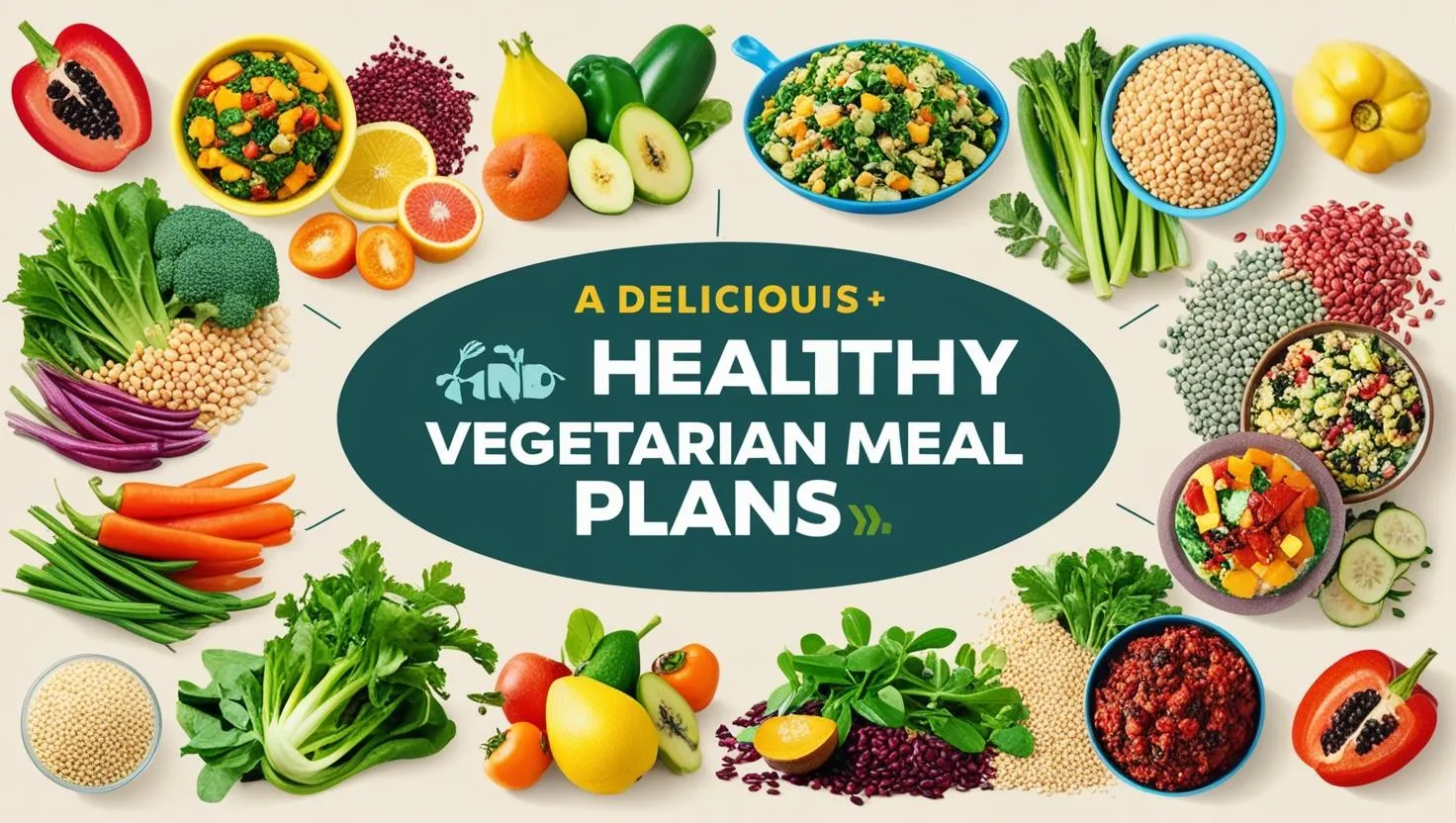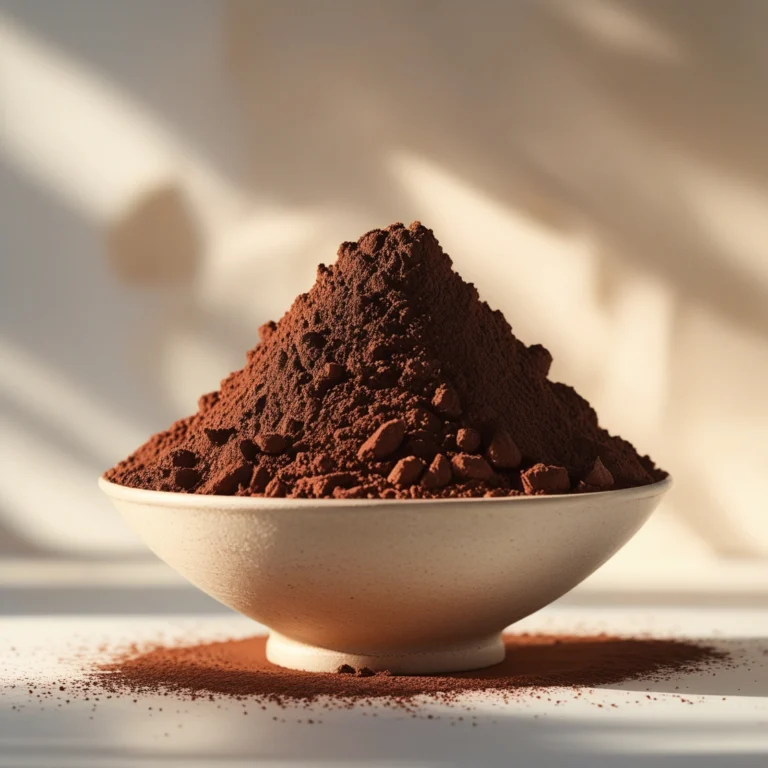Vegetarian Diet Plans for Weight Loss
Vegetarian Diet Plans for Weight Loss. Adopting a vegetarian diet can be an effective strategy for weight loss while also promoting overall health. Research shows that plant-based eating patterns not only help shed unwanted pounds but may also reduce the risk of chronic diseases like heart disease, diabetes, and certain cancers. If you’re considering a vegetarian approach to weight management, this comprehensive guide will walk you through everything you need to know to create an effective vegetarian diet plan for weight loss.
Understanding Vegetarian Diets
Before diving into weight loss strategies, it’s important to understand the different types of vegetarian diets:
- Vegan Diet: Excludes all animal products, including meat, fish, eggs, dairy, and honey. This is the strictest form of vegetarianism.
- Lacto-Vegetarian Diet: Excludes meat, poultry, fish, and eggs, but includes dairy products like milk, cheese, and yogurt.
- Lacto-Ovo-Vegetarian Diet: Excludes meat, poultry, and fish, but allows both eggs and dairy products. This is the most common type of vegetarian diet.
- Flexitarian Diet: Primarily plant-based but occasionally includes small amounts of meat, fish, or poultry. This is considered a semi-vegetarian approach.
The Science Behind Vegetarian Weight Loss
Scientific evidence supports the effectiveness of vegetarian diets for weight management. A meta-analysis published in the Journal of General Internal Medicine found that individuals assigned to vegetarian diet groups lost significantly more weight than those following non-vegetarian diets, with an average difference of 2.02 kg (4.4 pounds).
The research revealed that vegan diets produced the most substantial weight loss (an average of 2.52 kg or 5.5 pounds), while lacto-ovo-vegetarian diets resulted in more modest weight reduction (1.48 kg or 3.3 pounds). This suggests that the stricter the vegetarian diet, the greater the potential weight loss benefits.
Several factors contribute to why vegetarian diets may promote weight loss:
- Lower Calorie Density: Plant foods generally contain fewer calories per volume than animal products, allowing you to eat more food while consuming fewer calories.
- Higher Fiber Content: Plant-based diets are naturally rich in fiber, which increases satiety, regulates blood sugar, and promotes digestive health.
- Reduced Fat Intake: Traditional vegetarian diets tend to be lower in saturated fats compared to diets that include meat.
- Improved Insulin Sensitivity: Some studies suggest that plant-based diets may improve insulin function, helping to regulate blood sugar and reduce fat storage.
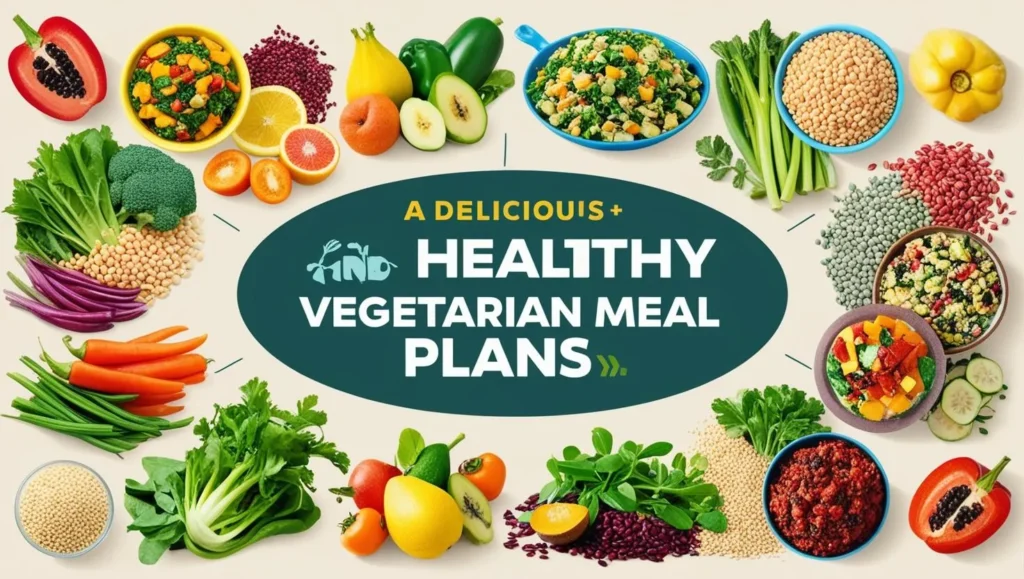
Common Pitfalls of Vegetarian Weight Loss
Despite the potential benefits, many people struggle to lose weight on a vegetarian diet. According to Julia Zumpano, RD, from the Cleveland Clinic, vegetarian diets “can make weight loss challenging due to their high percentage of calories from carbohydrates.” Here are some common mistakes to avoid:
1. Consuming Too Many Refined Carbohydrates
One of the biggest pitfalls is replacing meat with refined carbs like white bread, pasta, and pizza. These foods lack fiber and can cause blood sugar spikes, leaving you hungry and prone to overeating.
2. Overloading on Calorie-Dense Foods
While nuts, seeds, avocados, and coconut are nutritious plant foods, they’re also calorie-dense. Consuming large portions of these foods can lead to excessive calorie intake, hindering weight loss efforts.
3. Relying on Processed Vegetarian Products
Meat substitutes, vegan cheeses, and other processed vegetarian foods often contain added sugars, sodium, and preservatives. These convenience foods can be higher in calories than whole food alternatives.
4. Inadequate Protein Intake
Protein helps maintain muscle mass and increases satiety. Without proper planning, vegetarians might not consume enough protein, leading to increased hunger and potential muscle loss during weight loss.
5. Eating Oversized Portions
Plant proteins like beans and lentils often need to be consumed in larger volumes to match the protein content of meat, potentially leading to higher calorie intake if not properly managed.
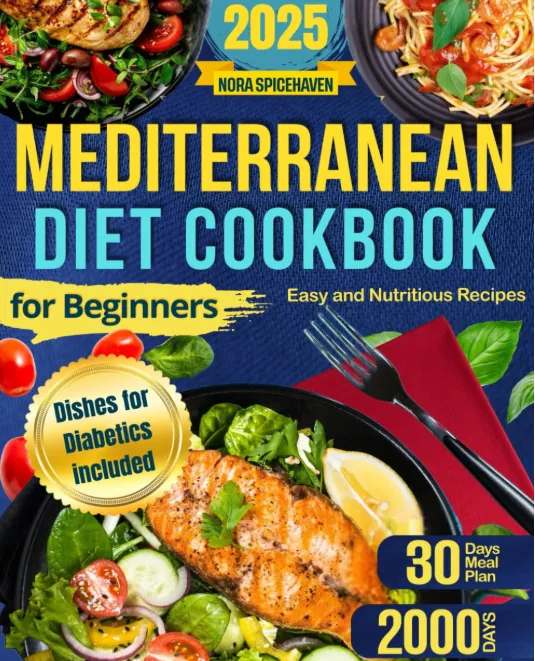
Mediterranean Diet Cookbook for Beginners: 2000 days of healthy, easy and satisfying recipes to kick-start a healthier lifestyle. Includes a 30-day eating plan for a healthy, balanced lifestyle.
Do you often feel tired, sluggish, or unsatisfied with your diet?
Have you tried restrictive diets that left you hungry and frustrated with no lasting results?
Do you want to improve your health without giving up the joy of eating?
What are the best foods to lose weight?
Our Health Hub article on the best foods for weight loss details a number of foods that may support weight loss as part of a calorie controlled diet, as well as highlighting that there is no one, specific food which will, on its own, magically help you shift weight. The real key to weight loss is having a balance of foods that contain all the nutrients your body needs. And the best food for weight loss is a mix of foods from these groups, whether you eat meat and fish or you are vegetarian or vegan:
- fruit and vegetables
- wholegrain starches
- low-fat dairy (or alternatives)
- protein
- unsaturated fats
In the end, weight loss is all about calories. The calories that you are consuming need to be lower than your calorie output if you want to lose weight. The NHS weight loss plan offers support for those looking to lose weight safely, by keeping a track of your calories and can help you learn to make healthier food choices.
The weekly plans include vegetarian options for all food groups. One benefit of vegetarian foods is that they are often also high in fibre which in turn keeps you feeling full and therefore helps you resist the temptation to snack in between meals. We stock all sorts of foods for vegans and vegetarians, so have a browse and see what foods can be included in your weight loss diet plans.
Diet plans
Planning healthy and delicious vegetarian or vegan meal plans does not have to be tedious and time consuming. Vegetarian diet plans are easier than ever to create and stick to, thanks to the abundance of foods and choices available. Here is an example of three days of meals that keeps your calorie allowance within the 1,900-1,400kcal NHS-recommended range for weight loss.4
- Day 1 Porridge, cheese omlette, hummous, vegetable chilli
- Day 2 Apricot porridge, minestrone soup, wholemeal fruit bar, tofu stir fry
- Day 3 Apple and muesli smoothie, mulligatawny soup, fruit and nut bar, black eyed bean, feta and herb burger, fruit sundae Check out the meal planner at Diabetes UK for more calorie and diet specific meal plans.
Nutritional Breakdown
A typical day on this plan aims to include:
Calories: 1200–1500 (adjust based on individual needs)
Protein: 50–60 grams
Carbohydrates: 150–170 grams
Fat: 30–40 grams
Fiber: 25–35 grams
Each meal is designed to balance macronutrients and keep you satiated, ensuring sustainable weight loss.
Effective Tips for Sustained Weight Management
Stick to recommended portions to avoid overeating. Use a smaller plate if necessary.
Drink 8-10 glasses of water daily to support digestion and metabolism.
Choose healthy, low-calorie options for snacks to curb hunger.
Schedule meal plans and prepare them in advance to avoid eating unhealthy options.
Combine this diet with regular exercise, such as yoga, walking, or gym workouts, to enhance weight loss.
By following this 7-day Indian vegetarian diet plan, you can take a step closer to your weight loss goals while enjoying wholesome and flavourful meals. Tailor the plan to your preferences and caloric needs for sustainable results.
Note: For those with any comorbid medical conditions it’s important to seek advice from a qualified dietitian or nutritionist and customise your diet plan as per your requirements and health conditions.
(This article is reviewed by Kalyani Krishna, Chief Content Editor)
Author Profile
M Sowmya Binu:
With over 15 years of expertise and a Postgraduate degree in Nutrition, M Sowmya Binu is a seasoned professional in the field of nutrition. Specializing in tailoring personalized diet plans, she underscores the significance of a balanced approach to health, emphasizing the integration of medication with dietary intake for holistic wellness. Passionate about equipping individuals with knowledge to make informed decisions, Sowmya adeptly develops insightful content encompassing a wide array of topics including food, nutrition, supplements, and overall health.
4 Benefits of a Vegetarian Diet for Weight Loss
Here’s why a vegetarian diet can be your best friend on your weight loss journey:
- Lower Calories: Most vegetarian foods are naturally low in calories, so you can eat a little more without feeling guilty. (but just a little 😃)
- Fibre-Rich Goodness: Dal, sabzi, green leafy veggies, fruits, and salads are packed with fibre, which keeps you full and prevents those pesky hunger pangs.
- Healthier Fats: Nuts and seeds are vegetarian and contain little to negligible saturated fats, which is great for us.
- Easy Digestion: Spices like jeera, turmeric powder, cinnamon, black pepper, ajwain, fennel seeds, dry mango powder, ginger and a million others not only add flavour but also aid digestion. They also come in super handy as “ghar ke nuskhes” for weight loss. For example, a pinch of cinnamon powder in a glass of water first thing in the morning is an excellent addition to your weight loss diet plan.
The beauty of a vegetarian diet is that most Indian kitchens have all the ingredients needed to support weight loss without compromising on taste. From lauki to palak, your fridge is packed with superfoods that are easy to cook and full of benefits.
Creating an Effective Vegetarian Weight Loss Plan
To maximize weight loss on a vegetarian diet, follow these evidence-based strategies:
1. Focus on Whole, Plant-Based Foods
Build your diet around:
- Non-starchy vegetables: broccoli, cauliflower, spinach, kale, bell peppers, zucchini, mushrooms
- Fruits: berries, apples, oranges, kiwi (in moderation)
- Whole grains: quinoa, brown rice, oats, barley, farro
- Legumes: lentils, chickpeas, black beans, kidney beans
- Lean plant proteins: tofu, tempeh, edamame, seitan
- Healthy fats (in moderation): avocados, olives, nuts, seeds
2. Balance Your Macronutrients
For effective weight loss, aim for this general macronutrient distribution:
- Protein: 25-30% of daily calories (focus on plant proteins)
- Carbohydrates: 40-50% of daily calories (primarily from vegetables, legumes, and whole grains)
- Fat: 25-30% of daily calories (mostly from unsaturated sources)
3. Control Portion Sizes
Even healthy foods can contribute to weight gain when consumed in excess. Some strategies include:
- Using smaller plates
- Measuring portions of calorie-dense foods like nuts, seeds, and oils
- Following the plate method: fill half your plate with non-starchy vegetables, one-quarter with plant protein, and one-quarter with whole grains or starchy vegetables
4. Plan Protein-Rich Meals and Snacks
Include protein at every meal and snack to maintain satiety and preserve muscle mass. Good vegetarian protein sources include:
- Greek yogurt (for lacto-vegetarians)
- Cottage cheese (for lacto-vegetarians)
- Eggs (for lacto-ovo-vegetarians)
- Tofu and tempeh
- Lentils and beans
- Seitan (wheat gluten)
- Protein-rich grains like quinoa
- Plant-based protein powders
5. Limit Highly Processed Foods
Minimize consumption of:
- Packaged veggie burgers and meat substitutes
- Refined grains (white bread, pasta, crackers)
- Sugary foods and beverages
- Fried foods
- Vegan junk foods (vegan cookies, cakes, ice cream)
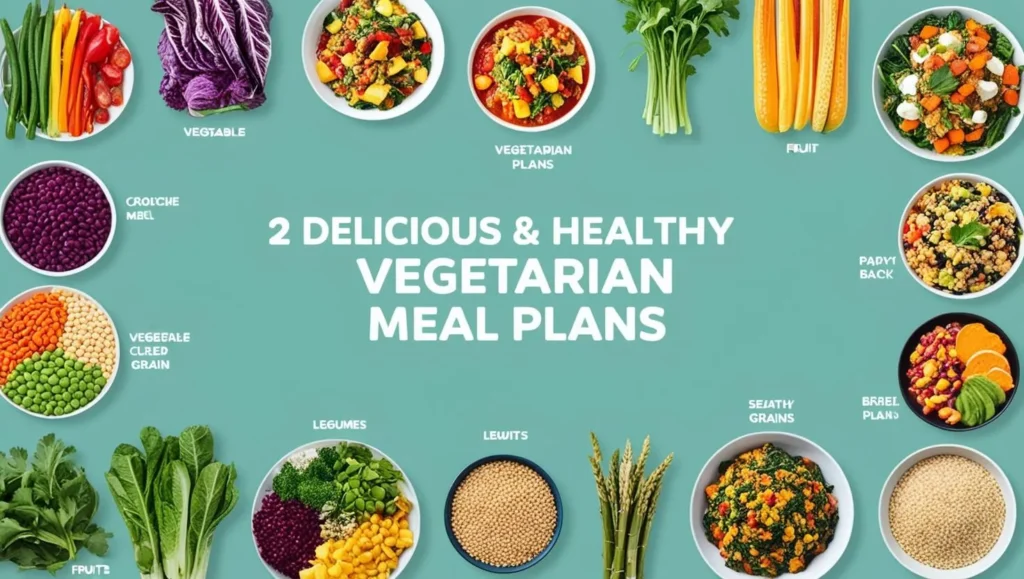
7-Day Vegetarian Weight Loss Meal Plan
Here’s a balanced 7-day meal plan designed for weight loss on a vegetarian diet. This plan provides approximately 1,200-1,400 calories per day, which is appropriate for most women seeking weight loss. Men or those with higher caloric needs may need to increase portions or add additional snacks.
Day 1
Breakfast (318 calories)
- Strawberry-Banana Green Smoothie (spinach, banana, strawberries, Greek yogurt)
Lunch (343 calories)
- Greek Salad with Edamame (mixed greens, cucumber, tomato, olives, feta, edamame)
Dinner (343 calories)
- Roasted Vegetable & Black Bean Tacos (2 corn tortillas with black beans, roasted bell peppers, onions, and zucchini)
Snacks (211 calories)
- 2 tablespoons unsalted almonds
- 1 plum
Day 2
Breakfast (230 calories)
- Egg Salad Avocado Toast (1 slice whole-grain bread, 1/4 avocado, 1 hard-boiled egg)
Lunch (346 calories)
- Greek Salad with Edamame (same as Day 1)
Dinner (496 calories)
- Kale Salad with Beets and Wild Rice
- 1 slice whole-wheat toast with 1/4 mashed avocado
Snacks (110 calories)
- 1/2 cup raspberries
- 1 hard-boiled egg
Day 3
Breakfast (268 calories)
- 1 cup plain nonfat Greek yogurt
- 1/4 cup raspberries
- 2 tablespoons unsalted almonds
Lunch (345 calories)
- Kale Salad with Beets & Wild Rice
Dinner (453 calories)
- Roasted Root Vegetables & Greens over Spiced Lentils
Snacks (133 calories)
- Cucumber salad with vinaigrette
- 1/2 cup raspberries
Day 4
Breakfast (318 calories)
- Strawberry-Banana Green Smoothie
Lunch (374 calories)
- Green Salad with Pita Bread & Hummus
Dinner (400 calories)
- Spaghetti Squash with Roasted Tomatoes, Beans & Almond Pesto
Snacks (108 calories)
- 1 hard-boiled egg
- 1 plum
Day 5
Breakfast (252 calories)
- 1 cup plain nonfat Greek yogurt
- 1/4 cup raspberries
- 2 tablespoons unsalted almonds
Lunch (320 calories)
- Creamy Lentil Soup
Dinner (420 calories)
- Tofu & Vegetable Scramble
Snacks (223 calories)
- 3/4 cup sliced carrots with 3 tablespoons hummus
- 3/4 cup frozen grapes
Day 6
Breakfast (230 calories)
- Egg Salad Avocado Toast
Lunch (374 calories)
- Green Salad with Pita Bread & Hummus
Dinner (430 calories)
- Squash & Red Lentil Curry
- 2 cups mixed greens with vinaigrette
Snacks (181 calories)
- 2 tablespoons almonds
- 1 hard-boiled egg
Day 7
Breakfast (318 calories)
- Strawberry-Banana Green Smoothie
Lunch (320 calories)
- Creamy Lentil Soup
Dinner (361 calories)
- Raw Vegan Zoodles with Romesco Sauce
- 3/4 cup cannellini beans
- 2 cups mixed greens with vinaigrette
Snacks (196 calories)
- 2 plums
- 1/2 cup raspberries with 2 tablespoons almonds
Tips for Success on a Vegetarian Weight Loss Diet
1. Prep Meals in Advance
Spend a few hours each week preparing components like:
- Hard-boiled eggs
- Roasted vegetables
- Cooked grains
- Prepared salad dressings
- Pre-portioned snacks
2. Stay Hydrated
Drink plenty of water throughout the day. Sometimes thirst can be mistaken for hunger. Herbal teas, black coffee, and sparkling water are also good options.
3. Read Food Labels Carefully
When purchasing packaged vegetarian foods, pay attention to:
- Calorie content
- Added sugars
- Sodium levels
- Portion sizes
- Ingredient lists (shorter is usually better)
4. Include Regular Exercise
While diet plays the primary role in weight loss, physical activity enhances results and improves overall health. Aim for:
- 150-300 minutes of moderate aerobic activity per week
- Strength training exercises 2-3 times per week
- Regular movement throughout the day
5. Monitor Your Progress
Track your journey using:
- Food journals
- Weight measurements (weekly, not daily)
- Body measurements
- Progress photos
- Energy levels and other non-scale victories
Special Considerations for Vegetarian Nutrition
When following a vegetarian diet for weight loss, pay special attention to these nutrients:
Protein
Ensure adequate protein intake by including a variety of plant proteins throughout the day. Combining different protein sources (like beans and rice) can help provide all essential amino acids.
Vitamin B12
This vitamin is found primarily in animal products. If you’re following a vegan diet, consider a B12 supplement or B12-fortified foods like nutritional yeast, plant milks, or cereals.
Iron
Plant-based iron (non-heme iron) is less easily absorbed than animal-based iron. Include iron-rich foods like lentils, spinach, and fortified cereals, and pair them with vitamin C-rich foods to enhance absorption.
Calcium
For those limiting or avoiding dairy, focus on calcium-fortified plant milks, leafy greens, almonds, and tofu made with calcium sulfate.
Omega-3 Fatty Acids
Plant sources include flaxseeds, chia seeds, hemp seeds, and walnuts, though they provide ALA rather than EPA and DHA found in fish. Consider an algae-based supplement if needed.
Zinc
Found in whole grains, legumes, nuts, and seeds. Soaking or sprouting these foods can improve zinc absorption.

